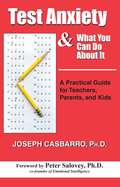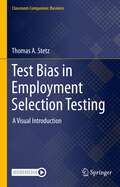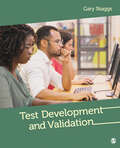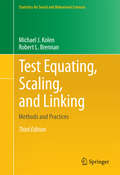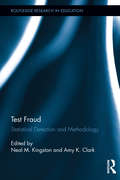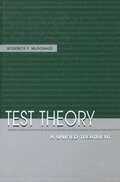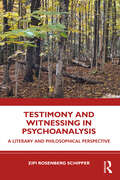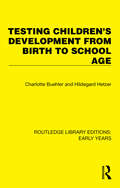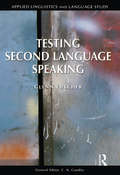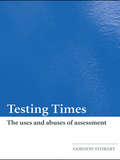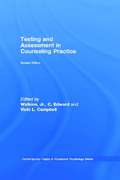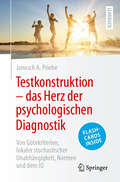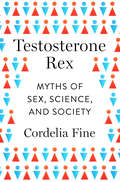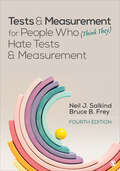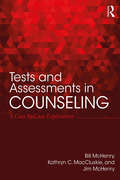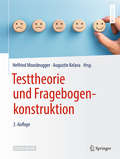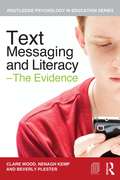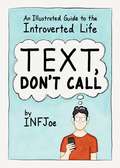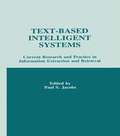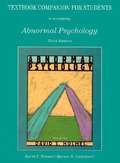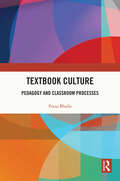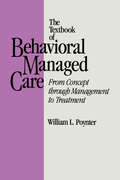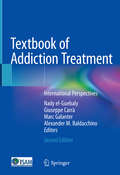- Table View
- List View
Test Anxiety and What You Can Do About It: A Practical Guide for Teachers, Parents, and Kids
by Joseph CasbarroHigher standards and greater accountability have contributed to an alarming rise in test anxiety in our students. To help them pass mandated assessments, teachers drill on facts and give endless practice tests. But teaching to the test isn't enough. High stakes testing produces high anxiety that, in turn, lowers performance. Teachers, parents, and kids must do more to minimize its negative effects and increase test results. But where do we begin? Test Anxiety & What You Can Do About It offers constructive and powerful strategies that specifically target the physical, emotional, and cognitive symptoms of anxiety. This book serves as a comprehensive and practical guide for test- takers of all ages. It is an essential resource for teachers and parents of students who are faced with the increased testing mandates of the No Child Left Behind Act Take control! Increase understanding, enhance recall, regulate emotions, and improve test performance through the reduction of test anxiety. This book is the right resource at the right time!
Test Bias in Employment Selection Testing: A Visual Introduction (Classroom Companion: Business)
by Thomas A. StetzThis book provides students with a concise introduction to test bias from a psychometric point-of-view without statistics. It uses easy to understand graphs to explain complex technical approaches to test bias giving readers a highly sought-after knowledge enabling them to be better consumers of tests.Studies performed by the Society for Human Resource Management (SHRM) consistently show that selection is a key competency for Human Resource (HR) professionals. Knowledge of test bias is a key component to effectively and legally performing this highly valued HR function. Unfortunately, test bias is rarely covered in HR classes or is presented in a highly technical manner geared to individuals with strong statistical and mathematical backgrounds. This book, requiring no previous statistical or mathematical knowledge, can be used as a supplemental textbook for any class that deals with selection, staffing, or measurement at the undergraduate or graduate level.
Test Development and Validation
by Gary Edward SkaggsTest Development and Validation by Gary Skaggs summarizes the latest test theories, frameworks for test development and validation, and guidance for developing tests in straightforward language in one core text. Students looking for clear, concise explanations of measurement, validity, and test development within a real-world context and with numerous examples will find this book to be an excellent learning resource. Author Gary Skaggs takes years of experience teaching test development to graduate students across social and behavioral sciences and consulting on a wide variety of government and institutional research projects to offer students a thorough, jargon-free, and highly applied book to help propel their own research and careers. Part I of the book, The Big Picture, sets the stage for test development, placing it within the larger context and history of measurement, emphasizing measurement concepts and their evolution over time. Part II, Test Development, covers the technical details of instrument and test development in logical order. Validation, Part III, links the conceptual bases provided in Part I with the technical process provided in Part II to conclude the book. For those students wanting to go further, software suggestions are referenced in the technical chapters, while Further Reading sections offer the original sources for more details. Exercises and Activities at the end of each chapter provide students a variety of ways to apply their knowledge, from conceptual questions to brief project ideas to data analysis problems.
Test Development and Validation
by Gary Edward SkaggsTest Development and Validation by Gary Skaggs summarizes the latest test theories, frameworks for test development and validation, and guidance for developing tests in straightforward language in one core text. Students looking for clear, concise explanations of measurement, validity, and test development within a real-world context and with numerous examples will find this book to be an excellent learning resource. Author Gary Skaggs takes years of experience teaching test development to graduate students across social and behavioral sciences and consulting on a wide variety of government and institutional research projects to offer students a thorough, jargon-free, and highly applied book to help propel their own research and careers. Part I of the book, The Big Picture, sets the stage for test development, placing it within the larger context and history of measurement, emphasizing measurement concepts and their evolution over time. Part II, Test Development, covers the technical details of instrument and test development in logical order. Validation, Part III, links the conceptual bases provided in Part I with the technical process provided in Part II to conclude the book. For those students wanting to go further, software suggestions are referenced in the technical chapters, while Further Reading sections offer the original sources for more details. Exercises and Activities at the end of each chapter provide students a variety of ways to apply their knowledge, from conceptual questions to brief project ideas to data analysis problems.
Test Equating, Scaling, and Linking
by Michael J. Kolen Robert L. BrennanThis book provides an introduction to test equating, scaling and linking, including those concepts and practical issues that are critical for developers and all other testing professionals. In addition to statistical procedures, successful equating, scaling and linking involves many aspects of testing, including procedures to develop tests, to administer and score tests and to interpret scores earned on tests. Test equating methods are used with many standardized tests in education and psychology to ensure that scores from multiple test forms can be used interchangeably. Test scaling is the process of developing score scales that are used when scores on standardized tests are reported. In test linking, scores from two or more tests are related to one another. Linking has received much recent attention, due largely to investigations of linking similarly named tests from different test publishers or tests constructed for different purposes. In recent years, researchers from the education, psychology and statistics communities have contributed to the rapidly growing statistical and psychometric methodologies used in test equating, scaling and linking. In addition to the literature covered in previous editions, this new edition presents coverage of significant recent research. In order to assist researchers, advanced graduate students and testing professionals, examples are used frequently and conceptual issues are stressed. New material includes model determination in log-linear smoothing, in-depth presentation of chained linear and equipercentile equating, equating criteria, test scoring and a new section on scores for mixed-format tests. In the third edition, each chapter contains a reference list, rather than having a single reference list at the end of the volume The themes of the third edition include: * the purposes of equating, scaling and linking and their practical context * data collection designs * statistical methodology * designing reasonable and useful equating, scaling, and linking studies * importance of test development and quality control processes to equating * equating error, and the underlying statistical assumptions for equating
Test Fraud: Statistical Detection and Methodology (Routledge Research in Education)
by Neal M. Kingston Amy K. ClarkThere has been an increase in awareness (and perhaps occurrence) of individual and organized cheating on tests. Recent reports of widespread problems with state student accountability tests and teacher certification testing have raised questions about the very validity of assessment programs. While there are several books that specifically detail the issues of test security cheating on assessments, few outline the statistical procedures used for detecting various types of potential test fraud and the associated research findings. Without a significant research literature base, the new generation of researchers will have little opportunity or incentive to improve on existing methods. Enlisting a variety of experts and scholars in different fields of testing, this edited volume expands on the current literature base by including examples of detailed research findings arrived at by statistical methodology. It also provides a synthesis of the current state of the art with regard to the statistical detection of testing infidelity, particularly for large-scale assessments. By presenting methods currently used by testing organizations and research on new methods, the volume offers an important forum for expanding the literature in this area.
Test Theory: A Unified Treatment
by Roderick P. McDonaldThis book introduces the reader to the main quantitative concepts, methods, and computational techniques needed for the development, evaluation, and application of tests in the behavioral/social sciences, including educational tests. Two empirical examples are carried throughout to illustrate alternative methods. Other data sets are used for special illustrations. Self-contained programs for confirmatory and exploratory factor analysis are available on the Web. Intended for students of psychology, particularly educational psychology, as well as social science students interested in how tests are constructed and used, prerequisites include a course on statistics. The programs and data files for this book can be downloaded from www.psypress.com/test-theory/
Testimony and Witnessing in Psychoanalysis: A Literary and Philosophical Perspective
by Zipi Rosenberg SchipperIn this fascinating volume, Zipi Rosenberg Schipper approaches the fundamental topic of testimony, seeking to recognize its value as a distinct and vital function in psychoanalytic work, separate from its inherited importance to work on trauma. Rosenberg Schipper introduces a revivifying philosophical, linguistic and psychoanalytic approach to the act of testimony, focusing on the role of witnessing in daily life and the importance it has as a therapeutic tool in psychoanalytic and psychological therapy. Throughout, she pinpoints three key psychoanalytic theories on patient testimony. She begins by looking at Freud’s foundational work on testimony as a means of concealing the unconscious and the questions of credibility in the consulting room this creates before looking at Winnicottian and Kohutian theories, whereby therapists take everything the patient says as a definitive truth. She concludes by looking at the Intersubjective and Relational schools of thought, where the therapist assumes the role of witness. By providing a comprehensive overview of the conflicting theories on the topic, Rosenberg Schipper equips practicing psychoanalysts and analysts-in-training with the tools necessary to utilize this vital therapeutic device and engage with it in treatment for all patients.
Testing Children's Development from Birth to School Age (Routledge Library Editions: Early Years)
by Charlotte Buehler Hildegard HetzerOriginally published in 1935, Testing Children's Development from Birth to School Age highlighted the greatly increased interest in measuring the development of pre-school children by other means than the older, inadequate "intelligence tests". In the early part of the twentieth century the work done at the Psychological Institute of the University of Vienna under the general direction of Dr Karl Buehler had become favourably known throughout Europe and the United States. This was also especially true of the studies in child psychology directed by the authors Dr Charlotte Buehler and her one-time assistant, Dr Hildegard Hetzer. The book contains developmental tests for the first six years of life; techniques for testing small children; information on the construction of tests and the evaluation their results. Today it can be read and enjoyed in its historical context.
Testing Second Language Speaking (Applied Linguistics and Language Study)
by Glenn FulcherThe testing and assessment of second language learners is an essential part of the language learning process. Glenn Fulcher's Testing Second Language Speaking is a state-of-the-art volume that considers the assessment of speaking from historical, theoretical and practical perspectives.The book offers the first systematic, comprehensive and up-to-date treatment of the testing of second language speaking. Written in a clear and accessible manner, it covers: Explanations of the process of test design Costing test design projects How to put the test into practice Evaluation of speaking tests Task types for testing speaking Testing learners with disabilities It also contains a wealth of examples, including task types that are commonly used in speaking tests, approaches to researching speaking tests and specific methodologies that teachers, students and test developers may use in their own projects. Successfully integrating practice and theory, this book demystifies the process of testing speaking and provides a thorough treatment of the key ethical and technical issues in speaking evaluation.
Testing Times: The Uses and Abuses of Assessment
by Gordon StobartAssessment dominates our lives but its good intentions often produce negative consequences. An example that is central to this book is how current forms of assessment encourage shallow ‘for-the-test’ learning. It is true to say that as the volume of assessment increases, confidence in what it represents is diminishing. This book seeks to reclaim assessment as a constructive activity which can encourage deeper learning. To do this the purpose, and fitness-for–purpose, of assessments have to be clear. Gordon Stobart critically examines five issues that currently have high-profile status: intelligence testing learning skills accountability the ‘diploma disease’ formative assessment Stobart explains that these form the basis for the argument that we must generate assessments which, in turn, encourage deep and lifelong learning. This book raises controversial questions about current uses of assessment and provides a framework for understanding them. It will be of great interest to teaching professionals involved in further study, and to academics and researchers in the field.
Testing and Assessment in Counseling Practice (Contemporary Topics in Vocational Psychology Series)
by C. Edward Watkins Vicki L. CampbellThe primary purpose of this revision remains identical to that of the first edition--to show how key personality, cognitive/behavioral, and vocational tests/assessment procedures can be used by counselors in their work with clients. Too often, assessment books only provide the reader with information about tests and assessment procedures. They do not, however, take the next step--showing readers how these tests/assessment procedures can be used and integrated into the actual work of counseling. This revision is designed to fill that void. Chapter authors, all of whom are experts in their respective topic areas, share the theoretical and research backgrounds about a particular test/assessment procedure and then provide a case example or examples to show how assessment data can be meaningfully incorporated into the counseling process.
Testkonstruktion – das Herz der psychologischen Diagnostik: Von Gütekriterien, lokaler stochastischer Unabhängigkeit, Normen und dem IQ
by Janosch A. PriebeDieses kompakte Lehrbuch richtet sich an Studierende, die einen ersten Einstieg in die Test- und Fragebogenkonstruktion wagen wollen, und an Praktizierende, die ihr Wissen aus dem Studium reaktivieren möchten. Das Buch erklärt kompakt und anschaulich, was psychologische Tests sind, welchen Kriterien die Qualität eines Tests genügen muss und nach welchen Prinzipien seine Konstruktion erfolgt. Es beschreibt, welche Schritte auf dem Weg zur Testkonstruktion gemacht werden müssen – von der Vorversion bis zur fertigen Endversion. Zusätzliches Material zu diesem Buch finden Sie auf lehrbuch-psychologie.springer.com.
Testosterone Rex: Myths of Sex, Science, and Society
by Cordelia Fine“Goodbye, beliefs in sex differences disguised as evolutionary facts. Welcome the dragon slayer: Cordelia Fine wittily but meticulously lays bare the irrational arguments that we use to justify gender politics.”—Uta Frith, emeritus professor of cognitive development, University College London Many people believe that, at its core, biological sex is a fundamental, diverging force in human development. According to this overly familiar story, differences between the sexes are shaped by past evolutionary pressures—women are more cautious and parenting-focused, while men seek status to attract more mates. In each succeeding generation, sex hormones and male and female brains are thought to continue to reinforce these unbreachable distinctions, making for entrenched inequalities in modern society. In Testosterone Rex, psychologist Cordelia Fine wittily explains why past and present sex roles are only serving suggestions for the future, revealing a much more dynamic situation through an entertaining and well-documented exploration of the latest research that draws on evolutionary science, psychology, neuroscience, endocrinology, and philosophy. She uses stories from daily life, scientific research, and common sense to break through the din of cultural assumptions. Testosterone, for instance, is not the potent hormonal essence of masculinity; the presumed, built-in preferences of each sex, from toys to financial risk taking, are turned on their heads. Moving beyond the old “nature versus nurture” debates, Testosterone Rex disproves ingrained myths and calls for a more equal society based on both sexes’ full, human potential.
Tests & Measurement for People Who (Think They) Hate Tests & Measurement
by Bruce B. Frey Neil J. SalkindWith a signature, conversational writing style and straightforward presentation, Neil J. Salkind’s best-selling Tests & Measurement for People Who (Think They) Hate Tests & Measurement guides readers through an overview of categories of tests, the design of tests, the use of tests, and some of the basic social, political, and legal issues that the process of testing involves. New co-author Bruce B. Frey has streamlined the table of contents for ease of use; added more content on validity and reliability throughout; more closely connected standardized tests to classroom instruction, adding more on classroom assessment; and added a chapter on surveys and scale development. An instructor website includes a test bank and PowerPoint slides.
Tests & Measurement for People Who (Think They) Hate Tests & Measurement
by Bruce B. Frey Neil J. SalkindWith a signature, conversational writing style and straightforward presentation, Neil J. Salkind’s best-selling Tests & Measurement for People Who (Think They) Hate Tests & Measurement guides readers through an overview of categories of tests, the design of tests, the use of tests, and some of the basic social, political, and legal issues that the process of testing involves. New co-author Bruce B. Frey has streamlined the table of contents for ease of use; added more content on validity and reliability throughout; more closely connected standardized tests to classroom instruction, adding more on classroom assessment; and added a chapter on surveys and scale development. An instructor website includes a test bank and PowerPoint slides.
Tests and Assessments in Counseling: A Case by Case Exploration
by Bill McHenry Kathryn C. MacCluskie Jim McHenryTests and Assessments in Counseling provides students with current information on assessment tools and techniques through detailed case scenarios and vignettes. Going beyond basic information about a multitude of assessments, the authors focus on the use of instruments in individual cases to allow readers to more fully grasp the integral relationship between tests and assessment data and the counseling process. Chapters guide students through choosing the most effective assessment tool, successfully administering the assessment, and making meaningful and useful results of the data with the client. Test questions are also included at the end of each chapter.
Testtheorie und Fragebogenkonstruktion (Springer-lehrbuch Ser.)
by Helfried Moosbrugger Augustin KelavaDieses Standard-Lehrbuch deckt das gesamte Themenfeld der Testtheorie und Fragebogenkonstruktion ab – von den Grundlagen im Bachelor-Studium bis zu vertiefenden Aspekten in Master-Studiengängen. Neben dem unverzichtbaren Prüfungswissen fürs Studium liefert es auch Fortgeschrittenen der psychologischen Diagnostik fundiertes Handwerkszeug für Forschungspraxis und Berufsalltag – von der Diagnostik im klinischen Setting bis hin zu Fragen des Assessments im Berufsleben. Die neue Auflage wurde grundlegend überarbeitet, aktualisiert und erweitert.
Text Messaging and Literacy – The Evidence
by Clare Wood Nenagh Kemp Beverly Plester"Well thought out and timely. This is the leading group in the world working on texting and literacy, and they have a strong track record of publications. It would also be the first book, as they say, to deal with the subject at an academic level. The focus on education is important, as this is where most of the anxieties lie. It will be a major step forward in creating a new climate." Professor David Crystal, author of The Cambridge Encyclopaedia of Language and The Cambridge Encyclopaedia of the English Language, Television consultant and presenter As children are given mobile phones at increasingly younger ages, there is considerable media coverage of claims that mobile phones, and text messaging in particular, are responsible for declining levels of literacy in children and young people. Such claims are often adopted wholesale by teachers and parents, despite the fact that there is an empirical literature which has failed to find a basis to these claims, and to the contrary has found that text messaging is supporting children’s literacy skills. Written by leading international researchers Text Messaging and Literacy presents an overview and discussion of the academic evidence for and against use of text messaging and mobile phones in supporting literate activity and discusses what conclusions we can and should draw about the impact of mobile phones, and their potential role in education. Areas covered include: the rise of texting and media reactions; children’s reading, spelling and texting; text messaging of children with language difficulties; using mobile phones for literacy development; texting and literacy skills in adolescents and adults; spelling and grammar in texting and beyond; the future of texting. In challenging existing assumptions the authors present the cutting edge of international research, highlighting their own studies involving children of all ages, adolescents and adults. This ground breaking book is essential reading for both researchers and students in education, educational psychology, literacy and new media and it’s impact on learning.
Text, Don't Call: An Illustrated Guide to the Introverted Life
by INFJoeAn illustrated guide to the challenges and pleasures of the introverted lifeIntroversion is "in." But there are still many misconceptions about introverts in the world. They're shy. Anti-social. They don't want to have close relationships. They're all cat people. They don't like big parties (okay, that last one might be true).INFJoe, the cartoon persona of artist and introvert Aaron Caycedo-Kimura, is here to set the record straight. Filled with charming comic book style illustrations, this book provides invaluable insights into the introverted life with plenty of humor and wit. Full of moments that will make introverts say, "That's so me!" as well as helpful tips on surviving at parties and in the workplace, Text, Don't Call is the perfect gift for your quiet friends, or the extroverted ones who could use some help to better understand the introverts in their lives.
Text-based intelligent Systems: Current Research and Practice in information Extraction and Retrieval
by Paul S. JacobsThe symposium on which this volume was based brought together approximately fifty scientists from a variety of backgrounds to discuss the rapidly-emerging set of competing technologies for exploiting a massive quantity of textual information. This group was challenged to explore new ways to take advantage of the power of on-line text. A billion words of text can be more generally useful than a few hundred logical rules, if advanced computation can extract useful information from streams of text and help find what is needed in the sea of available material. While the extraction task is a hot topic for the field of natural language processing and the retrieval task is a solid aspect in the field of information retrieval, these two disciplines came together at the symposium and have been cross-breeding more than ever. The book is organized in three parts. The first group of papers describes the current set of natural language processing techniques used for interpreting and extracting information from quantities of text. The second group gives some of the historical perspective, methodology, and current practice of information retrieval work; the third covers both current and emerging applications of these techniques. This collection of readings should give students and scientists alike a good idea of the current techniques as well as a general concept of how to go about developing and testing systems to handle volumes of text.
Textbook Companion for Students to Accompany Holmes Abnormal Psychology (3rd edition)
by David S. HolmesA textbook that systematically examines abnormal behavior from four perspectives--psychodynamic, learning, cognitive, and physiological--enabling students to compare and evaluate the various explanations for a specific disorder. This revised and updated edition (1st ed. , 1990) incorporates the changes brought about by the publication of DSM-IV, and provides extensive coverage to advances in the cognitive and physiological areas of abnormal psychology.
Textbook Culture: Pedagogy and Classroom Processes
by Pooja BhallaThis volume captures the essence of schooling in a structural manner and explores the classroom life in the larger schooling context. The emphasis is to uncover the necessary framework of classroom that is significant to understand the place of textbooks in the Indian school education system. By the use of ethnographic vignettes, it brings out the multiple patterns of teacher- student's interactions as they occur in different textbook-based situations. Through this, it sheds light on the primacy of the textbook approach in the classroom processes.The book also investigates the ways through which the students respond to the different pedagogic situations. In doing so, it explores the notions of student boredom, alienation, inclusion and exclusion, and the array of student-textbook experiences that are pivotal to the shape and reshape the classroom processes in the larger pedagogical discourses.This book will be of interest to researchers, students, and teachers of education studies, sociology and politics of education, teacher education, childhood and youth studies, and urban studies. It will also be useful for education policymakers, and professionals in the development sector.
Textbook Of Behavioural Managed Care
by William L. PoynterThe changing role of managed care can be a daunting challenge to both experienced clinicians and students entering into the practice for the first time. Managed care seems to have come out of nowhere and has affected the psychotherapy community so strongly that private-practice clinicians are finding that they must reinvent their practices in order to work well with managed care systems.The Textbook of Behavioral Managed Care presents, in a well organized and comprehensive manner, the basic definitions of managed care; its effects on clinicians; and most importantly, how clinicians can respond to the pressures of managed care and still maintain the quality of their practices. For experienced clinicians, the information in this volume will prove invaluable in adapting to the ever increasing role of managed care; for the student entering into practice, the book is an essential tool for understanding the forces that managed care has brought into play.The better managed care companies have two goals: to stretch behavioral health resources and, ultimately, to improve quality. In light of these two important tasks, this book demonstrates that truly effective implementation of managed care requires sophistication of experienced, knowledgeable, specialized therapists. The Textbook of Behavioral Managed Care will provide clinicians with a greater level of understanding that enables them to implement managed care in the most effective manner possible.
Textbook of Addiction Treatment: International Perspectives
by Marc Galanter Nady El-Guebaly Giuseppe Carrà Alexander M. BaldacchinoGET A 20% DISCOUNT ON THIS TITLE ENTERING THE CODE ISAM2020 from November 12 – December 31, 2020!Addiction is increasingly being recognized as a major global public health issue, and an ever-growing number of medical specialties, psychological and social science training programs, and professional associations are including addiction as part of their training and continuing education curricula. The first edition of this book presented an overview of the spectrum of addiction-related problems across different cultures around the globe. Sharing the experience and wisdom of more than 260 leading experts in the field, and promoted by the International Society of Addiction Medicine, it compared and contrasted clinical practices in the field of addiction medicine on the basis of neurobiological similarities as well as epidemiological and socio-cultural differences.Building on the success of this inaugural edition, and taking into account the formal and informal comments received as well as an assessment of current need, this textbook presents general updated information while retaining the most requested sections of the first edition as demonstrated by the number of chapter downloads. It also provides a basic text for those preparing for the ISAM annual certification exam. Written by some 220 international experts, it is a valuable reference resource for anyone interested in medicine, psychology, nursing, and social science.
